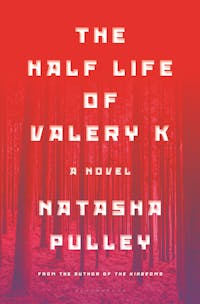The Half Life of Valery K
 Download image
Download image
ISBN10: 1635573270
ISBN13: 9781635573275
Hardcover
384 Pages
$28.00
CA$37.00
In 1963, in a Siberian prison, former nuclear specialist Valery Kolkhanov has mastered what it takes to survive: the right connections to the guards for access to food and cigarettes, the right pair of warm boots, and the right attitude toward the small pleasures of life so he won't go insane. But one day, all that changes: Valery's university mentor steps in and sweeps him from the frozen camp to a mysterious unnamed city. It houses a set of nuclear reactors, and surrounding it is a forest so damaged it looks like the trees have rusted from within.
In City 40, Valery is Dr. Kolkhanov once more, and he's expected to serve out his prison term studying the effect of radiation on local animals. But as Valery begins his work, he is struck by the questions his research raises. Why is there so much radiation in this area? What, exactly, is being hidden from the thousands who live in the town? And if he keeps looking for answers, will he live to serve out his sentence?
Based on real events in a surreal Soviet city, and told with bestselling author Natasha Pulley's inimitable style, The Half Life of Valery K is a sweeping new adventure for readers of Stuart Turton and Sarah Gailey.
Reviews
Praise for The Half Life of Valery K
“Natasha Pulley builds a surreal world that slowly reveals immense dangers. It's an absorbing Cold War thriller as well as a tribute to courage and determination.”—The Christian Science Monitor
“Another historical novel written with panache is Rebecca Stott's Dark Earth (4th Estate), the gripping tale of two women who flee to Londinium in 500 AD. It is a novel that puts a female perspective right at the centre of a time period usually dominated by men's stories. I also enjoyed Natasha Pulley's The Half Life of Valery K (Bloomsbury), an engrossing novel set in Siberia in 1963. The story was inspired by some chilling real events after the cover-up of a radiation leak.”—The Independent
“Pulley's impeccable prose, vivid and shot through with tenderness, lends a glint of lightness to this unsettling story.”—Daily Mail
“Natasha Pulley heads to the gulags, then to an atomic village, in her latest to combine fast-paced action and imaginative settings with beautifully developed queer relationships. When it comes to understanding the effects of radiation on the human body, Valery K is the best, so it's shocking but not too shocking when he's released from the gulag under one condition: he goes to work for his old college mentor, herself in charge of mysterious experiments in a Siberian village where everything, including the local residents, appears to be irradiated.”—CrimeReads
“From state tyranny and crimes against humanity to ingenuity and valor under deadly pressure as well as humor and forbidden love, Pulley's brilliantly conceived, vibrantly realized, and complexly suspenseful tale is all the more resounding in the glare of Russia's recklessness at Chernobyl during its latest, horrific invasion of Ukraine.”—Booklist (starred review)
“Scientific research, KGB shenanigans, queer love, and the heartache of suffering children are just a few of the enriching intricacies Pulley traces with intelligent wit and confident narration. A gifted writer of well-drawn characters, Pulley has given the nuclear noir genre a fresh and stimulating take on Chernobyl-style terror.”—Library Journal
“Provocative, unsettling . . . Pulley, extrapolating out from the records of a historic Soviet research center, raises questions about scientific experimentation and the ways in which it can be manipulated for less than honorable purposes. Her dark humor, which turns on the blind faith given to Soviet authority figures despite their outlandish claims, combines with complex characters and a clear understanding of radiation science to yield an explosive blend. The chilling result feels all too plausible.”—Publishers Weekly (starred review)

